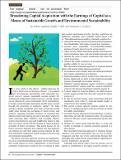Broadening Capital Acquisition with the Earnings of Capital as a Means of Sustainable Growth and Environmental Sustainability
Author(s)
Ashford, Nicholas A.; Ashford, Robert; Hall, Ralph P.
DownloadG84 TEFR OctNov2012_Broadening Capital Acquisition.pdf (302.5Kb)
PUBLISHER_POLICY
Publisher Policy
Article is made available in accordance with the publisher's policy and may be subject to US copyright law. Please refer to the publisher's site for terms of use.
Terms of use
Metadata
Show full item recordAbstract
In a prior article in this edition – entitled Addressing the Crisis in Employment and Consumer Demand – it was argued that environmental sustainability with sustainable economic recovery requires sustainable earning capacity for poor and middle-class people. In general, earning capacity can be enhanced by some combination of two contributions; (1) wages earned through employment and (2) money earned through the ownership of productive capital. The latter includes ordinary investment from wage savings that people might make through the purchasing of stocks, bonds, and property; changing ownership structures of businesses (see Marjorie Kelly’s approach of generative ownership), employee stock ownership plans (ESOPs), and extending effective market opportunities to poor and middle-class people so that they can acquire capital with the earnings of capital based on principles of binary economics. This article focuses on the binary economic approach and explains how this approach can enhance not only their capital earning capacity but also the demand for employment and the prospects for achieving environmental sustainability.
Date issued
2012-10Department
Massachusetts Institute of Technology. School of EngineeringJournal
The European Financial Review
Publisher
EBR Media
Citation
Ashford, Robert, Ralph P. Hall, and Nicholas A. Ashford. "Broadening Capital Acquisition with the Earnings of Capital as a Means of Sustainable Growth and Environmental Sustainability." The European Financial Review (October-November 2012): 70-74. © 2012 The European Financial Review
Version: Final published version
ISSN
1757-5680